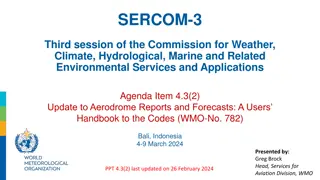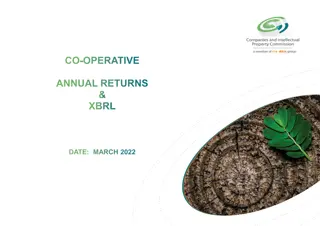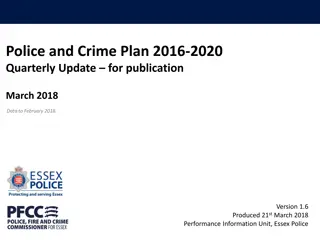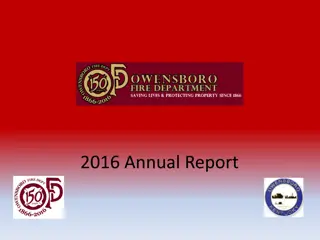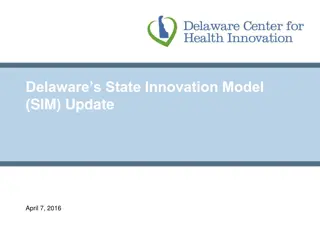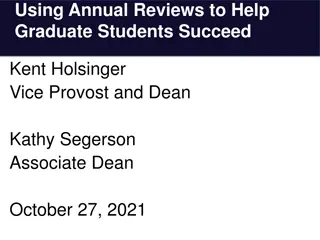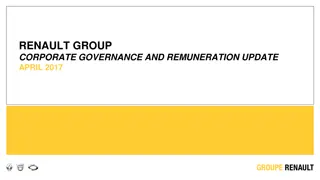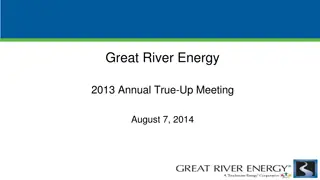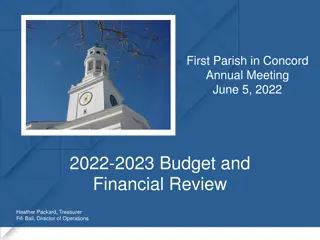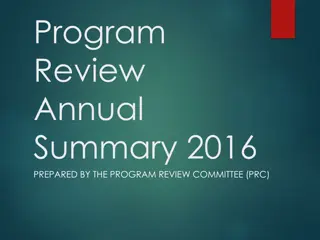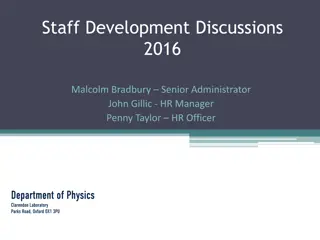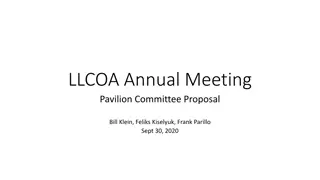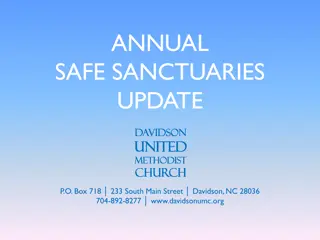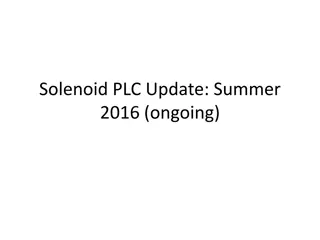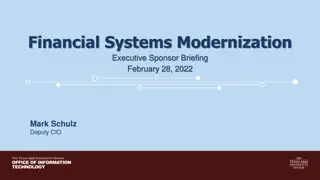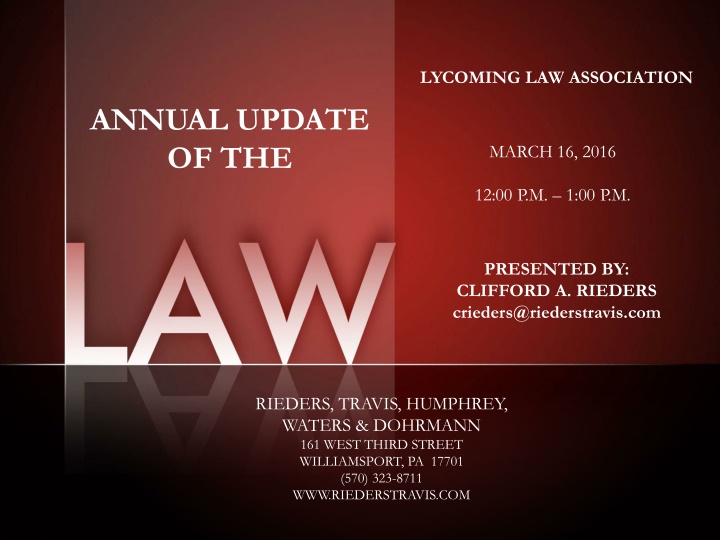
Lycoming Law Association Annual Update on Arbitration in PA Courts
Stay informed with the latest updates on arbitration cases in Pennsylvania courts presented by Clifford A. Rieders from Rieders, Travis, Humphrey, Waters & Dohrmann. Explore key legal rulings on arbitration agreements, including cases such as DirecTV, Inc. v. Imburgia, Wert v. Manor Care Carlisle, PA, LLC, Washburn v. Northern Health Facilities, and Wisler v. Manor Care of Lancaster, PA, LLC. Gain insights into the enforcement of arbitration provisions in non-personal injury and nursing home disputes under FAA regulations.
Download Presentation

Please find below an Image/Link to download the presentation.
The content on the website is provided AS IS for your information and personal use only. It may not be sold, licensed, or shared on other websites without obtaining consent from the author. If you encounter any issues during the download, it is possible that the publisher has removed the file from their server.
You are allowed to download the files provided on this website for personal or commercial use, subject to the condition that they are used lawfully. All files are the property of their respective owners.
The content on the website is provided AS IS for your information and personal use only. It may not be sold, licensed, or shared on other websites without obtaining consent from the author.
E N D
Presentation Transcript
LYCOMING LAW ASSOCIATION ANNUAL UPDATE OF THE MARCH 16, 2016 12:00 P.M. 1:00 P.M. PRESENTED BY: CLIFFORD A. RIEDERS crieders@riederstravis.com RIEDERS, TRAVIS, HUMPHREY, WATERS & DOHRMANN 161 WEST THIRD STREET WILLIAMSPORT, PA 17701 (570) 323-8711 WWW.RIEDERSTRAVIS.COM
ARBITRATION NON-PERSONAL INJURY 2
DIRECTV, Inc. v. Imburgia 136 S.Ct. 463 (2015) FAA states that a written provision in a contract providing for settle[ment] by arbitration of a controversy arising out of that contract...shall be valid, irrevocable, and enforceable, save upon such grounds as exist at law or in equity for the revocation of any contract. ... We here consider a California court s refusal to enforce and arbitration provision in a contract. In our view, that decision does not rest upon such grounds as exist...for the revocation of any contract, and we consequently set that judgment aside. The judgment was reversed and the case remanded for further proceedings. 3
ARBITRATION NURSING HOME 4
Wert v. Manor Care Carlisle, PA, LLC 124 A.3d 1248 (Pa. 2015) This case involved mandatory arbitration of a nursing home dispute. Previous ruling shows that NAF Designation voided an identical arbitration agreement. Post consent decree, Section 5 of the FAA, cannot preserve NAF- incorporated arbitration agreements unless the parties made the NAF s availability nonessential. NAF must administer its code unless the parties agree to the contrary. Underlying FAA policy, as interpreted by the Supreme Court in Marmet, does not mandate a different result because our conclusion is based on settled PA contract law principles that stand independent of arbitration. 5
Washburn v. Northern Health Facilities 121 A.3d 1008 (Pa. Super. 2015) Mrs. Washburn, having no POA for her husband, signed a stand-alone ADR between her husband and the nursing home. Mr. Washburn did not sign the ADR. No facts to show Mr. Washburn authorized her to sign. Issue: whether a valid agreement to arbitrate existed. Equitable estoppel does not assist the nursing home. No evidence or merit to the argument that Mr. Washburn was an intended third-party beneficiary of the arbitration agreement signed by his wife. Appealed from an order overruling preliminary objections in the nature of a petition to compel arbitration. The Superior Court affirmed. 6
Wisler v. Manor Care of Lancaster, PA, LLC 124 A.3d 317 (Pa. Super. 2015) Manor Care contends that the trial court erred in refusing to compel arbitration of executor s claims arising out of decedent's stay at a Manor Care Nursing Home. Trial court found the arbitration agreement invalid. The POA for decedent lacked the authority to enter into such agreement. Express authority exists where the principal deliberately and specifically grants authority to the agent as to certain matters. That did not happen. The decision should encourage parties seeking an agreement to arbitrate to ascertain the source of an agent s authority before allowing the agent to sign and arbitration agreement on a principal s behalf. 7
Tuomi v. Extendicare, Inc. 118 A.3d 1030 (Pa. Super. 2015) Decedent s husband brought negligence actions for wrongful death, and survival actions premised on negligence and negligence per se against assisted living facility and nursing home. A Voluntary Arbitration Agreement had been signed by the Administrator upon the patient s admission to Extendicare. PA Rule of Procedure 213(e) requires the consolidation of wrongful death and survival actions and the lower court concluded the actions would remain together in court. There were multiple defendants, one of whom did not have a predispute arbitration clause signed by the Administrator. Administrator alleged both contributed to the injuries and death of decedent. Superior Court held that FAA did not preempt state law mandating consolidation of wrongful death and survival actions, and was not required to bifurcate action to compel arbitration of survival claim. 8
Taylor v. Extendicare Health Facilities 113 A.3d 317 (Pa. Super. 2015) Estate brought wrongful death and survival action against nursing home facility after resident sustained injuries causing her death. An arbitration agreement signed by the decedent or his or her authorized representative is not binding upon non-signatory wrongful death beneficiaries and cannot be compelled to litigate their claims in arbitration. The Federal Arbitration Act does not contain an express preemption provision and Congress did not intend to occupy the field of arbitration and does not require parties to arbitrate absent an agreement to do so. Extendicare maintains that the survival claim must be severed and enforced in arbitration and that state law to the contrary is preempted. 9
Taylor v. Extendicare Health Facilities 113 A.3d 317 (Pa. Super. 2015) The court refused the severance concept. The wrongful death beneficiaries constitutional right to a jury trial and the state s interest in litigating the wrongful death and survival claims together require that they proceed in court rather than arbitration. 10
Bair v. Manor Care of Elizabethtown, PA 108 A.3d 94 (Pa. Super. 2015) Plaintiff filed a wrongful death and survival action claiming that Manor Care was neglectful and abused her mother during her stay in the facility which ultimately caused her death. Manor Care sought to have the case referred to arbitration. The court permitted discovery and an interlocutory appeal followed. Burden is on Manor Care to demonstrate that a valid agreement to arbitrate existed between the parties and that the dispute was within the scope of the agreement. The trial court determined that there was no agreement to arbitrate because Manor Care failed to affix its signature for consent. 11
NURSING HOME NEGLIGENCE - SOL 12
Dubose v. Quinlan 125 A.3d 1231 (Pa. Super. 2015) Mrs. Dubose, suffering from severe brain damage, developed a pressure wound while in a nursing home and ultimately passed away. Nursing home used a licensed practical nurse to provide advanced wound care, in violation of the Nurse Practices Act, for Mrs. Dubose s 10 pressure ulcers and systemic infection. Evidence showed that decedent was malnourished, dehydrated and suffered conscious pain from numerous bed sores. Mcare Act provides that wrongful death and survival actions may be brought within two (2) years from the date of death. Argument was made that the SOL began to run when Mrs. Dubose developed a pressure wound. The court clearly rejected that. 13
Dubose v. Quinlan 125 A.3d 1231 (Pa. Super. 2015) Defendant argued wrongful death actions are strictly limited to pecuniary damages. The court rejected that. Rejected was the claim that wrongful death does not encompass damages for emotional loss or mental pain and suffering. Evidence was sufficient to prove punitive damages. The wrongful death verdict was $125,000, and the Survival Act verdict was $1 million. The fact that Mrs. Dubose suffered permanent, debilitating brain injury does not mean that she was physiologically incapable of feeling pain. The verdict should not be discounted because of decreased mental functioning and poor prognosis. The nursing home cannot show that it was prejudiced by the jury s punitive damage award since it was less than the compensatory damages. There was no requirement to bifurcate the punitive damage phase of the trial. 14
NEGLIGENCE NON-PERSONAL INJURY 15
Gongloff Contracting v. L. Robert Kimball 119 A.3d 1070 (Pa. Super. 2015) Steel subcontractor brought action against architect for negligent misrepresentation, alleging it incurred numerous problems on construction project due to improper roof design. Architect filed joinder complaint to join general contractor, steel contractor and professional engineer. Architect filed motion for judgment on the pleadings based on the SOL and the economic loss doctrine. PA law bars claims brought in negligence that result solely in economic loss, but that limitation does not apply to Section 552 of the Restatement (Second) of torts. 16
Gongloff Contracting v. L. Robert Kimball 119 A.3d 1070 (Pa. Super. 2015) Gongloff alleged that Kimball was working on the project in order to provide guidance. Feasibility of construction of the roof in accordance with Kimball s design was called into question. This was not enough under Section 552 of the Restatement (Second) of torts. Section 552 states: 1. A misrepresentation of a material fact; 2. Made under circumstances in which that misrepresenter ought to have known its falsity; 3. With an intent to induce another to act on it; and 4. Which results in injury to a party acting in justifiable reliance on the misrepresentation. 17
NEGLIGENCE RELEASE 18
McDonald v. Whitewater Challengers, Inc. 116 A.3d 99 (Pa. Super. 2015) Rafting trip participant, a teacher who was chaperoning students on rafting trip, brought negligence action against rafting trip operator, alleging injury from participant s raft striking a rock. Participant signed an exculpatory release with the Defendant. The activity is considered an inherently dangerous sports activity and there is no public policy against a release in these circumstances. The exculpatory clause addressing negligence does not contravene PA s public policy. 19
NEGLIGENCE DRAM SHOP ACT 20
Juszczyszyn v. Taiwo 113 A.2d 853 (Pa. Super. 2015) Police officer filed complaint against bar owners, alleging negligence and liability under the Dram Shop Act. The duty of the possessor of the land is to use reasonable care to protect his or her invitees from unknown or non- obvious dangers. In this case the police officer was responding to a disturbance at the bar and encountered an intoxicated person and physically confronted that person creating a known risk. The court concluded that the police officer was not within the class of individuals that the Dram Shop Act was designed to protect. 21
NEGLIGENCE VALET 22
Moranko v. Downs Racing LP 118 A.3d 1111 (Pa. Super. 2015) Administratrix of driver s estate brought wrongful death and survival action against casino, alleging casino s valet parking service was negligent in returning car to visibly intoxicated driver who was later involved in a car accident and died. The court held that the casino s valet parking service did not have a duty to withhold driver s vehicle. Under PA law, a mutual bailment is created where a valet service accepts possession of a patron s keys and parks the vehicle as a service to those gambling on the casino premises and the vehicle must be returned. 23
NEGLIGENCE FALL DOWN 24
Reinoso v. Heritage Warminster SPE LLC 108 A.3d 80 (Pa. Super. 2015) A 60 year old woman and your 5 year old grandmother tripped and fell on a raised section of sidewalk at the Warminster Towne Center. The difference in sidewalk height was 5/8th of an inch in the middle of the walk where the plaintiffs in question were walking. The surrounding circumstances not only included a height difference between the sidewalk panels but also a recognized heightened duty to an individual as an invitee. Expert testimony indicated that the height differential exceeded safety standards, and testimony from the owner of the company charged with maintenance of the sidewalk that he considered the defect a tripping hazard and reported it to the landowner as such. 25
Stephens v. Clash 796 F.3d 281 (3rd Cir. 2015) Sixteen year old victim of illegal sexual activity brought action against an adult for injuries resulting from adult s violation of federal and state laws regarding sex with a minor. The victim was aware for more then two years of the infliction of the injury and the person who did it. The victim did not bring suit until after the 6 year SOL had expired and more then 3 years after the victim became an adult. An appeal was taken from dismissal of sexual battery claim. The discovery rule tolled the SOL for federal claims and PA s longer SOL for childhood sexual abuse should have applied to the sexual battery claim. The structure and the text of Section 2255 supports recognition of the discovery rule for the claims under Pennsylvania statute for child exploitation. 26
MEDICAL MALPRACTICE DISCOVERY 27
Venosh v. Henzes 321 A.3d 1026 (Pa. Super. 2015) Blue Cross appealed from a discovery order requiring Blue Cross to produce information concerning the quality-of-care review. Blue Cross was deciding whether to keep Dr. Henzes and Ms. Anderson as contract health care service providers. None of these purposes were present in it s quality-of-care review A corporation that provides health care insurance and not medical care is not a professional health care provider. The trial court rejected Blue Cross s invocation of the privilege established by the PA Peer Review Protection Act. The Superior Court affirmed. 28
Yocabet v. UPMC Presbyterian 119 A.3d 1012 (Pa. Super. 2015) Transplant donor and recipient filed actions against hospital and physicians, alleging medical malpractice after transplanting a Hep. C infected kidney. Hospital was required to produce materials it asserted were confidential under Peer Review Protection Act and attorney-client privilege. The confidentiality provisions of the Peer Review Act do not apply to the CMS/DOH investigation. The DOH is not a professional health care provider and did not conduct peer review. UPMC s assertion that a record or document automatically is covered by the peer review privilege because it was forwarded to a peer review committee, was rejected. 29
Yocabet v. UPMC Presbyterian 119 A.3d 1012 (Pa. Super. 2015) The argument that a corporate entity can obtain legal advice only when one of it s high-ranking officials meets privately with counsel for advice on behalf of the corporation was rejected as well. The party invoking a privilege must initially set forth facts showing that the privilege has been properly invoked before the burden shifts to the party asking for discovery to set forth facts showing that the disclosure will not violate the attorney- client privilege. 30
Karim v. Reedy, MD No. 11 CV 4598 (C.P. Lackawanna January 11, 2016) Malpractice action asserting obstetrical and nursing negligence in the management of plaintiff s labor and delivery that resulted in hypoxic brain damage to her child. Plaintiffs seek to compel the defendant-obstetrician and the defendant-hospital s labor and delivery nurse to answer certain questions that their counsel instructed them not to answer during depositions. Under the PA Rules of Civil Procedure and the controlling decisional precedent, malpractice plaintiffs may discover the past and present opinions of a defendant and defendant s agent concerning the health care treatment at issue. 31
Karim v. Reedy, MD No. 11 CV 4598 (C.P. Lackawanna January 11, 2016) No PA appellate statue, rule or appellate authority grants a party the right to withhold from discovery that party s relevant opinions, nor does it provide a malpractice defendant with the ability to prevent the discovery of those opinions, including opinions addressing the standard of care, by agreeing not to disclose those opinions at trial. The OB and nurse will be directed to submit to second depositions to answer the questions that their counsel instructed them not to answer. 32
MEDICAL MALPRACTICE INFORMED CONSENT 33
Shinal v. Toms 122 A.3d 1066 (Pa. Super. 2015) The doctor did not obtain informed consent for surgery prior to removal of a recurrent brain tumor. Four jurors had some connection with Geisinger but none knew the doctor personally or was ever treated by him. The court was within its discretion in not striking the jurors. The court said that MCARE is better served for dissemination of as much accurate information as possible regardless of the sources. 34
MEDICAL MALPRACTICE CHILD ABUSE 35
K.H. ex rel. H.S. v. Kumar 122 A.3d 1080 (Pa. Super. 2015) Child and parents brought negligence action against physicians and health care providers, alleging that they collectively failed to recognize, treat and report child abuse that resulted in permanent injury. Issue: Whether the lack of an express statutory civil remedy under the Child Protective Services Law, 23 Pa. C.S. 6301, et seq., implicitly precludes a common-law remedy in tort for harm sustained due to child abuse when the physician has failed to report reasonable suspicions that a child is a victim of abuse to the government authorities designated by the CPSL. Parents have a prima facie case of medical malpractice. Issue of material fact regarding whether the doctors breached the governing standard of care. The trial court erred in entering summary judgment. 36
MEDICAL MALPRACTICE VICARIOUS LIABILITY 37
Green v. Pennsylvania Hospital 123 A.3d 310 (Pa. 2015) Decedent was admitted to the ICU with short breath, rapid breathing and wheezing and was put on a ventilator. Medical staff attempted to force air through an improperly placed trach causing the trachea to collapse. A plaintiff may pursue a negligence action on a direct liability or vicarious liability theory. The MCARE Act codifies vicarious liability of hospitals under the doctrine of ostensible agency. The lower court found that the doctor had not been proven to be an ostensible agent of the hospital. 38
Green v. Pennsylvania Hospital 123 A.3d 310 (Pa. 2015) In this Court s view, when a hospital patient experiences an acute medical emergency, such as that experienced by Decedent in the instant case, and an attending nurse or other medical staff issues an emergency request or page for additional help, it is more than reasonable for the patient, who is in the throes of medical distress, to believe that such emergency care is being rendered by the hospital or its agents. The trial court determined that allowing the nurse to offer causation testimony as to another nurse, might confuse the jury. Based on the expert report, the proffered expert causation testimony of the nurse was based on a course of conduct by nurses and physicians and therefore had the potential to confuse the jury. 39
MEDICAL MALPRACTICE CAUSATION 40
Pomroy v. Hospital of University of Pennsylvania 105 A.3d 740 (Pa. Super. 2014) Plaintiff died as a result of complications from removal of a polyp utilizing a surgical technique instead of colonscopically due to concerns of colon perforation. No informed consent signed. The patient has to prove but for doctor s failure to insist upon the saline method endoscopically and plaintiff would have rejected the surgical option. No evidence was offered that plaintiff would have changed her mind. The court clearly stated that the standard of care is properly addressed in a claim for battery due to lack of informed consent, which was not pled in this case. Superior Court held that there was no evidence of causation and husband failed to establish valid standard of care required of surgeon. 41
Czimmer v. Janssen Pharmaceuticals, Inc. 122 A.3d 1043 (Pa. Super. 2015) Verdict in favor of a minor born with a cleft palate whose mother was prescribed Topamax during her pregnancy. Janssen claimed that before conception, it attempted to assert a warning of genital birth defects in the Topamax label but the FDA precluded it. Warnings were given in respect to genitalia malformation but not this specific warning. The preemption claim failed. The evidence allowed the jury to conclude that the doctor would not have prescribed Topamax if Janssen adequately warned the doctor that Topamax carried a risk of cleft palate. The court concluded the minor has an independent right to recover medical expenses incurred before turning 18. 43
Gurley v. Janssen Pharmaceuticals, Inc. 113 A.3d 283 (Pa. Super. 2015) Consumer brought products liability action against drug manufacturer after her child suffered birth defects allegedly caused by manufacturer s prescription anti-seizure drug, Topamax. The manufacturer claimed preemption based on the argument that the patient was attempting to change the pregnancy category from C to D controlled by the FDA. Trial court order specifically prohibiting patient from presenting any argument or evidence that the manufacturer could have unilaterally changed the Topamax Pregnancy Category without FDA approval. Defendant failed to establish federal preemption of the failure to warn claim under decision in Wyeth v. Levine, 129 S.Ct. 1187 (2009). 44
Gurley v. Janssen Pharmaceuticals, Inc. 113 A.3d 283 (Pa. Super. 2015) Defendant argued that because the mother ingested Topamax using her mother s prescription instead of her own in the month before her pregnancy, she severed the link between the learned intermediary and herself as the patient. This does not permit defendant from evading liability for the child s injuries. 45
Vosburg v. NBC Seventh Realty Corp. 122 A.3d 393 (Pa. Super. 2015) Grantor s heirs brought action against property owner alleging that excavation and processing of rock on site constituted trespass and conversion of mineral rights estate that had been reserved by grantors. By construing the reservation in a 1951 deed as excepting only coal and mineral beneath the surface and extractible by deep mining, we conclude that the rock herein was not included within the reservation. There was no trespass to the reserve mineral rights of the owners and the processing and crushing of the rock did not constitute a conversion. Court reversed the grant of partial summary judgment in favor of the landowner and remanded for entry of summary judgment in favor of NBC. 46
SUBROGATION 47
Montanile v. Board of Trustees of the National Elevator Industry Health Benefit Plan 577 U.S. ____ (2016) When a third party injures a participant in an employee benefits plan under the Employee Retirement Income Security Act of 1974 (ERISA) 88 Sat. 829, as amended, 29 U.S.C. 1001 et seq. The plan pays covered medical expenses. The terms of these plans include a subrogation clause requiring a participant to reimburse the plan if the participant later recovers money from the third party for his injuries. Under ERISA, plan fiduciaries can file civil suits to obtain appropiate equitable relief... to enforce the terms of the plan. 48
Montanile v. Board of Trustees of the National Elevator Industry Health Benefit Plan 577 U.S. ____ (2016) What happens when a participant obtains a settlement fund from a third party, but spends the whole settlement on nontraceable items? When a participant dissipates the whole settlement on nontraceable items, the fiduciary cannot bring a suit to attach the participant s general assets under 502(a)(3). The suit is not one for appropriate equitable relief. It is unclear whether the participant dissipated all of his settlement in this matter, so we remand for further proceedings. 49
SUBROGATION WORKERS COMP 50


